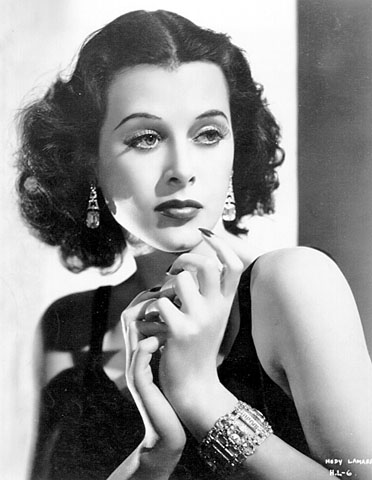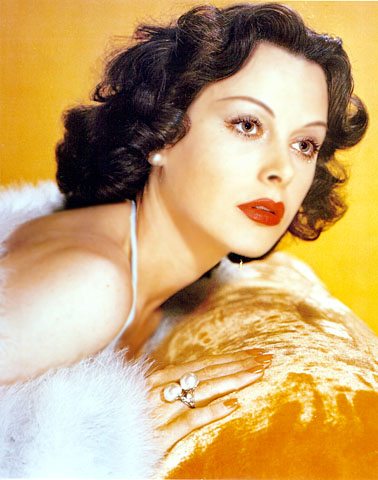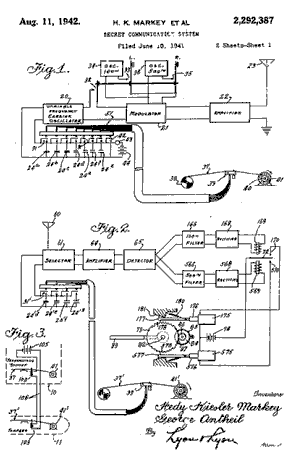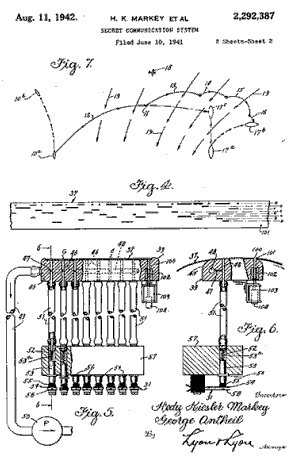|
|
Introduction
 Britney Spears, was not the first star to juggle the weight of fame and a gift
for technical matters. Austrian born film star, Hedy Lamarr, of the 1930 and
40s was also a gifted electrical engineer.
Britney Spears, was not the first star to juggle the weight of fame and a gift
for technical matters. Austrian born film star, Hedy Lamarr, of the 1930 and
40s was also a gifted electrical engineer.
Lamarr was frequently quoted as saying, "
Any girl can be glamorous. All you have to do is stand still and look stupid
." She may have played that role on the silver screen, but when it came to
real life, Hedy proved that brainpower was everything.
Before examining her important contribution, let's take a quick look at her
background.
First of all, Lamarr was only her stage name. She was actually born Hedwig Eva
Maria Kiesler in Vienna, Austria back on November 9 th, 1913.
As a teenager, Hedy attended acting school and quickly made the transition into
films. Like most movie stars, her first few films were forgettable. Yet, the
one that she made at age seventeen made her an international star. A very
controversial star, that is. In the 1933, Czech film Ecstasy, Lamarr acted in a
steamy love scene and appeared nude in a 10-minute swimming sequence. That was
definitely not the thing to do. While mild by today's standards, her nudity was
considered morally unacceptable at the time, and the film was banned in the
United States for several years on charges of indecency.
In 1933 (at age nineteen), her parents placed her into an arranged marriage
with an Austrian armament manufacturer named Fritz Mandl. Mandl was the type of
shady character who would sell arms to anyone, even if it meant selling them in
violation of the Versailles Treaty.
Of course, to make these deals, Mandl had to entertain all of his prospects.
This included attending hundreds of dinners with the likes of Hitler and
Mussolini. And what would a business dinner be like without Mandl's gorgeous
and equally famous wife dazzling these arms developers, buyers, and
manufacturers? But, as we will soon learn from the outcome of this story, Hedy
did not just entertain these men. She listened carefully and learned a great
deal.
To an outsider, Hedy had everything. She was married to one of the wealthiest
men in Europe. She lived in the famous Salzburg castle where the Sound of Music
was filmed. Add to that all the clothes, jewellery, servants, and cars (one
1935 Mercedes owned by Mandl sold for over $200,000 several years ago) one
could ever want. It sure sounds like the ideal life to me, but it was not.
Hedy, became more of a trophy than a wife to Mandl. He was a control freak and
would not even let her go swimming without his supervision. After four years of
marriage, Hedy could take no more. She decided to escape.
In her first attempt to see if she could get away, Mandl followed her. She was
forced to sneak into a club that had peep shows upstairs. Hedy paid off the
attendant to keep his mouth shut, but Mandl paid even more to get in. Hedy was
forced to hide in one of the rooms. While in there, a male customer came in and
assumed that she was the lady he had hired. Without going into all of the
details, Hedy was forced into the position of making love to the man to avoid
her husband (she claimed that he was banging on the door).
During her real escape, Hedy supposedly drugged the maid that was assigned to
her, put on a maid's uniform, and walked out the service entrance to freedom.
Hedy eventually made it to London where she appeared on the stage.
 Hedy, hopped aboard the ship
Normandie
on a cruise for Hollywood and stardom. She signed a contract with MGM's Louis
B. Mayer while on the boat, but he insisted on a name change to avoid the
controversy from Ecstasy. At this point, MGM publicist Howard Strickland
(according to a 1970 New York Times article) approached Hedy and handed her a
typewritten list of last names and asked her to make a choice. You guessed it -
she chose Lamarr and the rest is Hollywood history. Lamarr was immediately
crowned the most beautiful woman in the world by MGM and quickly became one of
Hollywood's glamour gals.
Hedy, hopped aboard the ship
Normandie
on a cruise for Hollywood and stardom. She signed a contract with MGM's Louis
B. Mayer while on the boat, but he insisted on a name change to avoid the
controversy from Ecstasy. At this point, MGM publicist Howard Strickland
(according to a 1970 New York Times article) approached Hedy and handed her a
typewritten list of last names and asked her to make a choice. You guessed it -
she chose Lamarr and the rest is Hollywood history. Lamarr was immediately
crowned the most beautiful woman in the world by MGM and quickly became one of
Hollywood's glamour gals.
Which leads us to the real focus of this story - her incredible invention.
The other lead character in this story, George Antheil. Antheil was
internationally famous for his mechanistic avant-garde musical style. When
Antheil moved to Hollywood, he became a film composer and a syndicated
columnist for Esquire magazine, for which he also contributed articles on
romance and endocrinology. He even published a book on the subject the 1937
Every Man His Own Detective: A Study of Glandular Endocrinology
. What made him an expert on this subject one will never know. In the summer of
1940, Lamarr sought out Antheil. They were neighbours in Hollywood and
supposedly met at a party. The topic of conversation changed to the impending
war and torpedoes. Lamarr feared Hitler (remember that she actually knew the
guy) and began to talk about an idea that she had for the radio control of
torpedoes. At the time, radio control sounded like a great idea, but was not
practical. All one had to do was jam the particular frequency that the torpedo
operated on and the missile would fail to reach its target.
Lamarr was sitting at the piano with Antheil when that flash of genius struck
her. Antheil was hitting keys on the piano and she would follow. It became
clear that Antheil was changing the keys that he was hitting, yet he was still
able to communicate to her. What if this could be translated into radio control
for a torpedo?
The next day they sat on his floor and figured the whole scheme out. Lamarr
realised that the frequency needed to randomly change so that the enemy could
not jam it. Any attempt to knock out the signal controlling the missile would
only knock out a small blip of the communication stream and have virtually no
effect on its overall control. Hence, the concept known as "frequency hopping"
was born.
Of course, getting this grand scheme to actually work was another story. Keep
in mind that this was the time of large vacuum tubes, not the miniaturised
microprocessors that rule our world today.
Antheil offered the solution to the problem. He had previously composed his
Ballet Mechanique
, which was scored for sixteen player pianos to perform at the same time. He
suggested using punched piano rolls to keep the radio transmitter and torpedo
receiver in synch. The transmitting signal was designed to broadcast over a
band of eighty-eight possible frequencies - one for each key of the piano
keyboard.
It took Lamarr and Antheil several months to work out the exact details of
their invention.

|

|
Then, in December of 1940, they sent a description of their idea to the
National Inventor's Council (set up by the government to get ideas from the
general public). Very few of the hundreds of thousands of submissions that the
Council ever received actually caused any kind of excitement, but Lamarr and
Antheil's did. Under the direction of the Council's chairman (and inventive
bigwig over at General Motors) Charles Kettering, the government helped to
improve on the concept. Patent 2,292,387 for the "Secret Communication System"
was granted on August 11, 1942. (The patent is actually under her married name
at the time - Hedy Kiesler Markey.)
Unfortunately, other members of the council were less than enthusiastic.
There's no surprise here - just think about the feasibility of placing a
synchronised player piano mechanism into a torpedo and having it operate
properly. The Navy declared the mechanism too cumbersome and shelved the idea.
The concept of frequency hopping was too far ahead of its time. Lamarr and
Antheil pursued their invention no further.
Yet, Lamarr was still able to help out in another way - by selling war bonds.
As part of one promotion, anyone that purchased $25,000 worth of bonds could
get a kiss from Lamarr. She was actually able to sell $7 million worth in one
night.
Not all great ideas are forgotten, however. In 1957, engineers at the Sylvania
Electronics Systems Division, located in Buffalo, New York, used transistor
electronics to accomplish the goal that Lamarr and Antheil had set out to
conquer years before. Finally, in 1962 (three years after the Lamarr/Antheil
patent expired), the concept of frequency hopping was used by the United States
government in the communication systems placed aboard ships sent out to
blockade Cuba.
Today, the concept is not only used by the military (it is used in the Milstar
defence communications satellite system), but has also become the technology
behind the latest in wireless Internet transmission and the newest cellular
phones. A quick search of the United States Patent Office shows 1203 patents
dealing with frequency shifting (now called "spread spectrum") between 1995 and
1997. How much influence the Lamarr-Antheil patent has had, if any, on this
technology will probably never be known.
Lamarr never earned a penny from this invention that so many others have
profited from. Instead, she slowly faded from public view. She was married and
divorced six times between 1933 and 1965 to Fritz Mandl, Gene Markey, Sir John
Loder, Ted Stauffer, W. Howard Lee (who later married actress Gene Tierney ,
and Lewis J. Boles. In 1966, Lamarr made international headlines when she was
arrested for shoplifting in the May department store in Los Angeles, but was
acquitted by a 10-2 jury vote. The bad publicity from this incident coupled
with her controversial autobiography "Ecstasy and Me" (purportedly ghost
written and not approved by Ms. Lamarr) brought an end to her movie career.
On March 12, 1997, Hedy Lamarr was finally honoured by the Electronic Frontier
Foundation for her great contribution to society. Her son Anthony Loder
accepted the award for his mother and played an audio-tape for the audience -
the first time she had publicly spoken in over two decades.
Hedy Lamarr passed away on January 19, 2000 at her Casselberry home in Florida.
The bulk of her nearly three million dollar estate was willed to her two
children, but a portion was left to her former personal secretary and to a
friend. Most surprisingly, however, was that she bequeathed $83,000 to a local
police officer who had befriended her in the last years of her life. Lamarr
asked that her ashes be scattered over the Vienna Woods, near where she was
born in Austria.
In one of those weird twist-of-fates, that same son Anthony today owns a Los
Angeles phone store in which half of the phone systems that he sells are based
on his mother's pioneering technology.
|
|